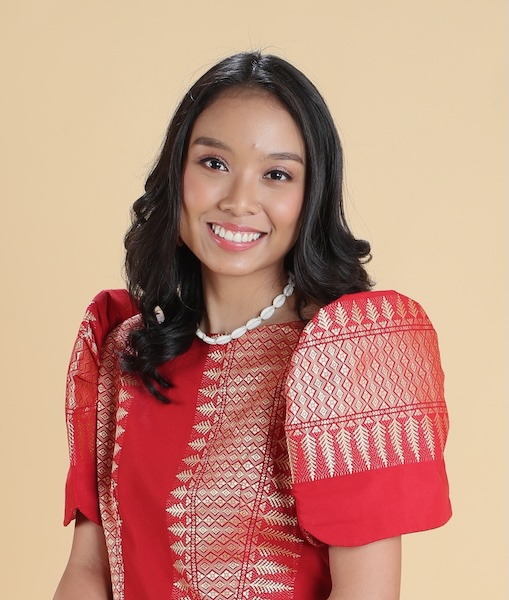Background: In his address to the first assembly of the International Association of Jesuit Universities (IAJU) in Bilbao, Spain, in 2018, Father Superior Arturo Sosa, S.J., emphasized the importance of “education for world citizenship.” Since 2022, the IAJU Global Citizenship Curriculum Project and the IAJU Global Citizenship Fellows Program have brought together thousands of students from the international network of Jesuit institutions to engage in dialogue and develop leadership skills as global citizens.
Project Manager Jane Fitzpatrick, who supports the IAJU Global Citizenship programs, connected with some of the Global Citizenship alumni ambassadors during the fall 2025 semester to talk about their experiences with the programs and what it means to be global citizens as students at Jesuit universities across the world.
Biography: Phoebe De Leon is a graduate student at the Ateneo de Manila University in the Philippines. She is a member of the IAJU Global Citizenship Fellows Program 2024-2025 cohort and serves as an alumni ambassador for the IAJU Global Citizenship Curriculum Project during the fall 2025 semester.
Please share a little bit about yourself: Where are you from, where do you go to school, and what are you studying?
I'm Phoebe—born in the Philippines, raised in Kuwait, and now back in the Philippines. I study at the Ateneo de Manila University where I graduated with a degree in political science and a minor in development and the law. I'm also working through a master's degree in public management at the same university.
What was it like when you first participated in a Global Student Dialogue? What did you take away from that experience?
It was a sobering experience. Sharing space with students from across the globe, especially those who had witnessed conflict and systemic issues up close, made my academic knowledge feel suddenly abstract. Where I had only lectures and news clips, they had lived reality. Suddenly, I became aware of the limits of my own comprehension: there are issues that I simply cannot understand completely, no matter how much I study them. Translation was, likewise, a key struggle as a native Filipino speaker. English was our lingua franca and while I am fluent in the language, I could not quickly and accurately articulate the full nuance of my country's experience in a language other than my own. Ultimately, the dialogue taught me that while our shared Jesuit principles unite us, our lived experiences are vastly different, and the essential work of global citizenship begins with the patience to truly listen across those differences.
How have the global citizenship programs impacted your understanding of the Jesuit network? Do you feel more connected with the global network now that you’ve participated in the programs?
I had already begun engaging with the Asia-Pacific bloc of the Jesuit network for a service-learning program hosted by the Association of Jesuit Colleges and Universities in Asia Pacific (AJCU-AP) earlier in the year, and it was a wonderful experience meeting more Jesuit university administrators, hearing from them how their universities mobilize resources to address issues that are close to them.
Additionally, the sheer size and distribution of the Jesuit network places us at a unique and powerful position within the global academy. Our universities have extensive reach into different cultures, political systems, and socioeconomic challenges. This vast network, bound by a commitment to social justice, raises a collective responsibility to act upon increasingly existential issues like climate change, forced migration, and global inequality. Participating in the programs made me realize that the network is an ideal platform for translating academic knowledge and faith-based values into coordinated, meaningful global impact.
Why did you decide to stay involved with the IAJU Global Citizenship Curriculum Project by becoming an alumni ambassador?
I wanted to familiarize myself more with the Jesuit network, particularly its student body, and better understand how universities across the world operationalize our common Ignatian principles.
With all of your experience in our programs so far, how would you define global citizenship?
Global citizenship is fundamentally an action-oriented commitment to the world. It's the thoughtful and compassionate recognition that the problems affecting our local communities are often mirrored or influenced by global issues. It demands that we use our education and resources as guided by Ignatian principles to actively engage with complex challenges, listen deeply to diverse perspectives, and work to create a just, equitable, and sustainable world for all.
Which Jesuit value means the most to you, and how does it inspire you to act as a global citizen?
My personal favorite is the Latin maxim "non multa sed multum" ["not many things but much"]. While it may not be as mainstream as the values we consider more universal in Jesuit universities such as magis and being people for others, I believe it to be crucial to the Jesuit tradition of intellectual depth. The world is faced with so many problems that evolve by the day and birth more problems; as such, instead of engaging with many issues simultaneously, thus stretching ourselves too thin, "non multa sed multum" encourages on the part of the individual the deep, sustained commitment necessary to affect meaningful, systemic change, one problem at a time. Focused individual effort compounds into tangible outcomes.
What message would you want to send to all the students across the Jesuit network about global citizenship?
Inasmuch as St. Ignatius and the Jesuit tradition he left are rooted in a belief in God, one need not be a Catholic to live out the principles we are taught in our universities (e.g., people for others, magis...). The ultimate invitation of the Jesuit tradition, as it relates to global citizenship, is to engage with the world—to set it on fire—and create meaningful change therein, motivated by a deep compassion for one's neighbors. Love does not require religion, but it does require faith in the existence of a force of good, one that we are invited to be a part of.

